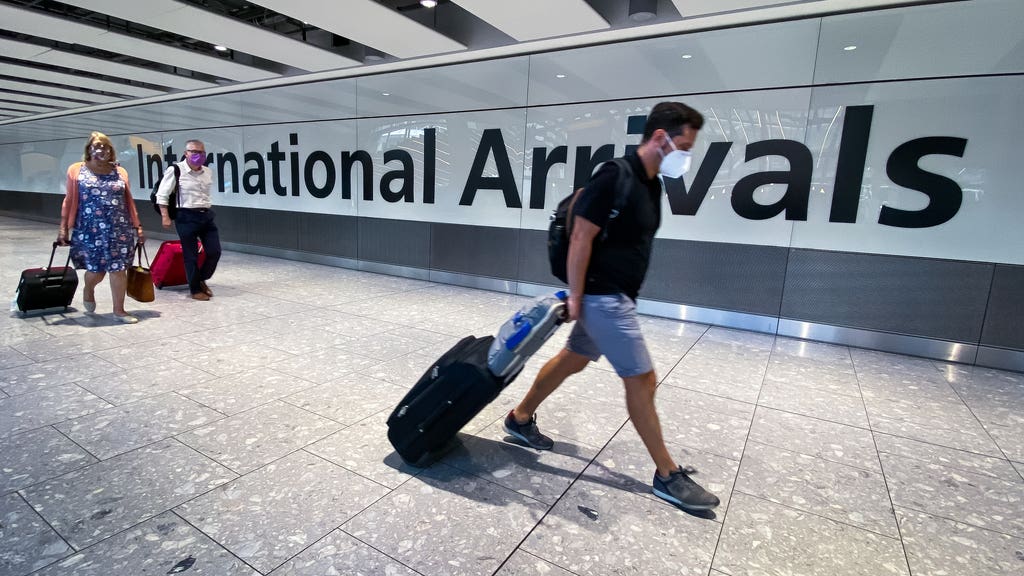Regulator Rejects Heathrow’s Bid To Raise £2.6bn Through Higher Charges

Heathrow’s bid to increase airport charges to recover £2.6 billion lost during the coronavirus pandemic has been rejected by the aviation regulator.
Civil Aviation Authority (CAA) director Paul Smith described the plan as “disproportionate and not in the interests of consumers”.
It has allowed the west London airport to initially raise only an additional £300 million through higher charges.
Heathrow’s passenger numbers have fallen to the lowest level since the 1960s, with just 461,000 people travelling through the airport in February.
That represents a 92% decline compared with February 2020.
In relation to the additional money Heathrow wants to recover, the CAA said it will “consider this issue further” as part of the airport’s next regulatory period, named H7, which begins on January 1 next year.
Mr Smith insisted the CAA recognises that “these are exceptional circumstances for the airport and there are potential risks to consumers if we take no action in the short term”.
He went on: “The decision we have announced today will incentivise and allow Heathrow to maintain investment, service quality and be proactive in supporting any potential surge in consumer demand later this year.”
Heathrow said it faces loses of around £3 billion due to the virus crisis.
An airport spokeswoman claimed the CAA has “failed to deliver” in its duties “to consumers and to Heathrow’s financeability”.
She said the CAA’s ruling “falls far short” of what is required through “regulatory principles” which enable investors to recover their capital.
She added: “This undermines investor confidence in UK regulated businesses, and puts at risk the Government’s infrastructure agenda.
“The CAA will need to address all the issues related to adjustment fully in the upcoming H7 regulatory settlement to attract the investment needed to maintain service, keep prices lower than they would otherwise be and protect resilience through the recovery.”
The CAA did confirm it will allow the airport to raise charges to recover the £500 million “it incurred efficiently” on its third runway project between 2017 and March 1 2020.
IAG, parent company of British Airways, the airline that operates the most flights at the airport, said in a statement that it is “extremely disappointed” with the decision, which will “unfairly penalise consumers”.
It went on: “Heathrow is the most expensive hub airport in the world.
“For over seven years, passengers paid Heathrow higher airport charges to cover the risk in the case of lower traffic.
“Meanwhile Heathrow’s shareholders have earned nearly £4 billion in dividends.
“The airport has deliberately rewarded its investors at the expense of consumers and now the regulator is asking passengers to bail it out.
“The CAA’s role is to protect consumers’ interest, not Heathrow’s shareholders’ profits.
“Post-Brexit this makes the UK even less competitive and will drive traffic to other airports.
“We’re assessing our options.”
Willie Walsh, director-general of airline body Iata and former IAG chief executive, said: “The CAA have caved to pressure from Heathrow.
“Consumers will pay millions more to travel, to the benefit of Heathrow’s shareholders.
“Heathrow’s landing charges are already the highest in the world, damaging UK competitiveness and burdening travellers.
“To make this even more acute as the industry gears up for a restart is madness.”
Heathrow currently charges £21.08 per departing passenger.
This will increase by 30p from the start of 2022 following the CAA’s announcement.
The regulator has not calculated what the charge would have been if the airport’s proposal was approved.
Since January 1, Heathrow has also added an additional £8.90 fee per passenger to help pay for services such as baggage systems, lighting and check-in desks during the collapse in demand for air travel.




